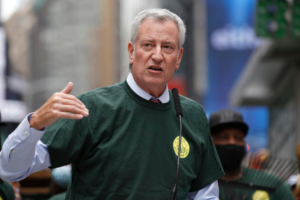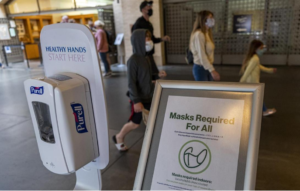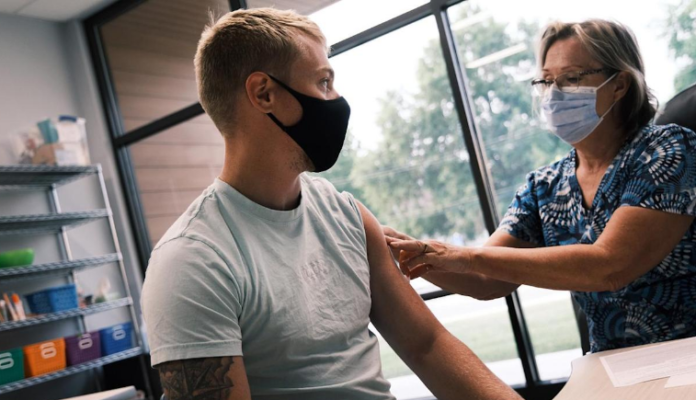As the hypercontagious Delta variant propels COVID-19 cases and hospitalizations toward record highs in Southern hot spots such as Florida, Louisiana, Arkansas, Mississippi, and Alabama — and as infection rates rise in every single U.S. state — a rare consensus seems to be uniting many politicians and pundits across the ideological spectrum.
Sure, Delta is bad, they say. But not bad enough to bring back indoor mask mandates.
That, they insist, would be overkill.
The only problem? Experts say that right now is precisely the wrong time to discourage universal masking.
“We know that vaccinated, asymptomatic, mildly symptomatic people who are infected can spread the infection” because of Delta, Dr. Anthony Fauci, the nation’s top infectious disease expert, said Sunday. “So a person’s individual decision to not wear a mask not only impacts them. … You very well may infect another person who may be vulnerable, who may get seriously ill.”
And “even if vax mandates (plus upcoming formal FDA approval) turn the tide, it’ll be months before we get to high enough vaccine rates to tamp down the virus,” Dr. Bob Wachter, chair of the Department of Medicine at the University of California, San Francisco, added Tuesday on Twitter. “Until then, anything other than universal indoor masking is simply bonkers.”

Despite the fact that mask mandates have been “associated with a decrease in daily COVID-19 case and death growth rates within 20 days of implementation,” according to the Centers for Disease Control and Prevention, Republican officials have long been eager to leave masks behind — so eager, in fact, that the GOP leaders of Texas, Florida, Missouri, Arizona, and Iowa, among other red states, have actually prohibited local authorities from requiring them in public.
Predictably, those same leaders balked last week when the CDC recommended that even vaccinated Americans in high-transmission areas resume covering their faces indoors to slow Delta’s rapid spread. Republican House members revolted. Republican senators refused to cover their faces. Florida Gov. Ron DeSantis thundered that his state would “say no to lockdowns, no to school closures, no to restrictions, and no to mandates.” Within days, DeSantis had blocked local schools from requiring masks as well, forcing the state’s largest K-12 district to reverse its own mask mandate so it wouldn’t lose funding.
But lately, attitudes have shifted, and it’s no longer just Republicans who are resisting. While cities such as Los Angeles, Atlanta, and St. Louis now require masks indoors, New York’s left-wing Mayor Bill de Blasio declined to mandate indoor masking earlier this week, claiming it would detract from his “focus on vaccination, vaccination, vaccination.” Instead, de Blasio decided to require proof of inoculation for indoor activities such as drinking, dining, and exercising.
“Masks can be helpful,” the mayor told CNN. “But they don’t change the basic reality. Vaccination does.”
Meanwhile, influential, libertarian-leaning columnists such as Andrew Sullivan and Josh Barro have been pushing a similar message: vaccination, good; masks for vaccinated people, irrelevant.
“The vaccines work very well against Delta, so stop badgering the vaccinated to wear masks,” read the headline of Barro’s latest column.
“Take the rational precautions — a solid vaccine — and go about your business as you always did,” added Sullivan. “Yes, I’ll wear a mask indoors if I’m legally required or politely asked. But I don’t really see why anyone should. In a free society, once everyone has access to a vaccine that overwhelmingly prevents serious sickness and death, there is no reason to enforce lockdowns again, or mask mandates, or social distancing any longer. In fact, there’s every reason not to.”

The root argument here — right, left and center — is simple and at least superficially appealing. The vaccines work. Americans have had ample opportunity to get vaccinated. The people who have refused to avail themselves of that opportunity are now overwhelmingly the same people who are getting sick and spreading the virus. So why should we force “all the responsible people to go back to constraining their everyday lives for the sake of the vaccine-averse,” as Sullivan put it? Critics of masking also say such constraints send a counterproductive message to unvaccinated people that even if they do act responsibly and inoculate themselves, their own lives won’t really get any better because of it.
Unfortunately, the reality of Delta right now is a lot more complicated than mask critics acknowledge — and because of that, they end up dramatically overstating the costs of indoor masking while drastically downplaying its benefits, according to experts.
“Six months ago, I felt like I understood all of the key variables when it came to the virus and vaccines. And when I learned that a variable had changed with Delta, I assumed nothing else had,” Wachter confessed Tuesday. “But now I see that it’s best to assume that nearly every parameter is different — usually for the worse.”
Wachter went on to list a few of these changes. The fact that Delta is two to three times more contagious than the original virus. The fact that just five minutes of exposure can trigger transmission, as opposed to 15. The fact that Delta cases “may be more serious on average.” The fact that scientists are starting to think that immunity against Delta — from either the vaccines or the virus itself — partially “wanes in ~6 months.” And the fact that “vaxxed people probably can spread” Delta to others.
So yes, if you’re vaccinated and concerned only about your own health, then masks — an inconvenience that many Americans dislike because they “inhibit our social interactions and deprive us of the ability to see each other’s faces,” as Barro argued — might not be worth it. The existing vaccines remain effective and highly protective against serious illness, hospitalization, and death from Delta.
But that’s rather shortsighted in light of how Delta actually seems to operate. As Wachter pointed out, the vaccines remain very effective against hospitalization and death, but they are less effective at blocking Delta from infecting you than previous variants — and once a vaccinated person is infected with Delta, they too can transmit the virus. This, of course, is precisely why the CDC now recommends that even vaccinated Americans mask up in public indoor settings.
We don’t know yet exactly how much less protection the vaccines provide against infections from Delta, or how much they affect transmission. But recent data is suggestive. A brand-new survey of 98,000 volunteers by researchers at Imperial College, London — the most extensive real-world study so far — found that fully vaccinated people were 49 percent less likely than unvaccinated people to test positive for COVID-19 during the recent U.K. Delta spike, and 60 percent less likely to experience symptoms. An earlier Israeli study came to a similar conclusion about the Pfizer vaccine.
Sixty percent is still a significant degree of protection. But it’s far less than Pfizer’s original, pre-Delta effectiveness of 95 percent. A striking 25 percent of Americans now say they personally know someone who has tested positive for COVID-19 during the last month, according to a new Yahoo News/YouGov poll — and nearly half of that group says the infected person was either partially or fully vaccinated. With preliminary research showing that vaccinated people can carry similar amounts of virus in their noses as unvaccinated people, it stands to reason that breakthrough infections and transmission are probably not as rare as experts had hoped.
“Overall, these findings certainly are concordant w/ increased Delta breakthrough symptomatic infections were seeing and a major decline in protection (~95% w/ mRNA) compared with previous strains,” tweeted Dr. Eric Topol, head of the Scripps Research Translational Institute in La Jolla, Calif. “All of this reflects Delta’s immune evasiveness. We’re very lucky it’s holding up for the reduction of hospitalizations/deaths but this [variant] is far more formidable for both transmission and our immune response.”
Again, if a vaccinated person is infected with Delta, they will almost certainly survive and most likely stay out of the hospital (although they may get sick enough to miss a few days of work). The bigger issue is who else they infect, how sick those people get, and how this continued spread exacerbates and extends the ongoing surge of the Delta variant.
Right now, about 140 million Americans are still unvaccinated. The United States’ top priority should be fully inoculating as many of these people as possible — a point on which voices across the political spectrum agree. But the vaccination process takes five or six weeks from start to finish, which isn’t fast enough to turn the tide on Delta. In addition, about 40 million unvaccinated Americans aren’t even eligible for vaccination yet, because they’re under 12, and they probably won’t be eligible until late fall or early winter.
So in the meantime, what collective responsibility do Americans have to keep unvaccinated people as safe as possible from Delta?
Barro, for one, argued that “the vaccinated have no moral obligation to save the unvaccinated from themselves.” Sullivan characterized unvaccinated people as “delusional and deranged” and said society should just “let it” — meaning the Delta variant — “rip.” “The obviously correct public policy is to let mounting sickness and rising deaths concentrate the minds of the recalcitrant,” he added.
But that doesn’t quite capture the complexity or the humanity of the situation. Polls show that only half of the unvaccinated adults — about 40 million people — have completely ruled out vaccination. Any one of the other 100 million unvaccinated Americans could theoretically be vaccinated someday soon.
Tens of thousands of vaccine holdouts in hot spots like Florida and Louisiana have already changed their minds because of Delta. Others might change their minds in the coming weeks, as additional employers and businesses require vaccination — and as local hospitals continue to fill because of COVID.
Fewer and fewer of these hospitalized individuals are seniors, who have largely been vaccinated. Instead, doctors say Delta has created a new category of the patient: younger and “sicker, quicker.” In places where the spread is sky-high, pediatric wards are starting to overflow. School is right around the corner. Kids under 12 stand a much lower chance of getting seriously ill or dying from COVID, but the more COVID they’re exposed to, the more of them will get sick or die, or suffer long-term complications. And not a single one of them has even had a chance to get vaccinated yet.
So while vaccination (with a likely boost from the growing number of vaccine requirements) is the best long-term solution for COVID, the best short-term way to slow the spread of Delta and immediately protect as many Americans as possible is for everybody, vaccinated and unvaccinated, to wear a mask indoors until cases inevitably plummet, as they did in other Delta-ravaged countries such as India and the U.K.
Will unvaccinated people hold up their (much heavier) end of the masking bargain in the days ahead? Probably not: According to the latest Yahoo News/YouGov poll, twice as many vaccinated U.S. adults (71 percent) as unvaccinated U.S. adults (37 percent) say Delta makes them “more likely to wear a mask” — while twice as many unvaccinated adults (53 percent) as vaccinated adults (25 percent) say it makes “no difference.”
Is this unfair? Almost certainly. But just because irresponsible people won’t behave responsibly doesn’t mean responsible people shouldn’t, either. It also doesn’t mean that leaders should make responsible behavior even less likely by declining to demand it from everyone. (Not incidentally, most Americans once again favor public mask mandates after opposing them in June and July.)
As Wachter explained, reaching the kind of population-wide levels of vaccination and immunity that could keep dangerous variants like Delta at bay in the future will take months, at best. No matter what we do, many thousands of Americans will fall ill and get hospitalized and die before then. And yet minimizing that toll is as easy as slipping on a mask indoors. No lockdowns, no school closures, no draconian restrictions — just a mask. For more than a year, that wasn’t too much to ask. Is it too much to ask now?



